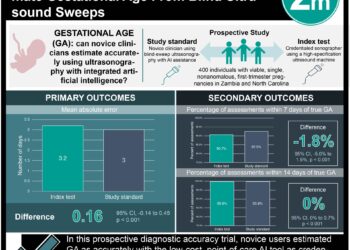Quick Take: Screening for breech presentation using universal late-pregnancy ultrasonography
Fetal presentation has long been determined by way of clinical examination only, despite the relative ease with which breech presentation can be identified through ultrasound screening. As such, many women continue to present in labor with an undiagnosed breech presentation, associated with increased fetal morbidity and mortality. In this prospective cohort study (2008-2012), 3879 nulliparous women were assessed by way of ultrasound examination at 36 weeks gestation for fetal presentation. Where breech presentation was detected, an external cephalic version (ECV) was routinely offered. If unsuccessful or not performed, women were offered either planned cesarean section (C-section) at 39 weeks or attempted vaginal breech delivery. To compare the likelihood of different modes of delivery and associated long-term health outcomes for universal ultrasound as compared to current practice, a probabilistic economic simulation model was constructed. Researchers found that 4.6% of women were diagnosed with breech presentation at 36 weeks. In these women, ECV was attempted in 46.9%, with a 14.3% success rate. Overall, 19 of the 179 women delivered vaginally (10.6%), 110 delivered by elective C-section (61.5%), and 50 delivered by emergency C-section (27.9%). There were no women with undiagnosed breech presentation in labor in the entire cohort. Based on the authors’ economic analysis, on a population level, the use of ultrasound would identify roughly 14,826 otherwise diagnosed breech presentations in England annually, reducing emergency C-sections and vaginal breech deliveries by 0.7% and 1.0%, respectively. Universal use of ultrasound would also prevent 7.89 neonatal mortalities annually in England. This study therefore shows that universal late-pregnancy ultrasound effectively assessed fetal presentation and may eliminate undiagnosed intrapartum breech presentation in nulliparous women. This has important implications in reducing fetal morbidity and mortality associated with breech presentation at delivery.
Click to read the study in PLOS Medicine
Image: PD
©2019 2 Minute Medicine, Inc. All rights reserved. No works may be reproduced without expressed written consent from 2 Minute Medicine, Inc. Inquire about licensing here. No article should be construed as medical advice and is not intended as such by the authors or by 2 Minute Medicine, Inc.






